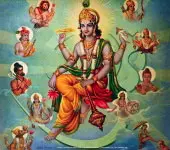The term 'Sanatana' means 'eternal'. The name 'Sanatana Dharma' for Vedic religion is very appropriate. No other language has a word equivalent to 'dharma'. In English, the word used is 'religion', but the essence of dharma is not fully conveyed by 'religion'. The word 'religion' carries a very limited and narrow meaning; however, Sanatana Dharma is so vast that it encompasses not only this life but also past and future lives and their consequences.
In the scriptures, dharma is defined as 'धारणात् धर्मः' (dharanat dharmah), which means dharma is that which upholds us and leads us away from all kinds of destruction and degradation. Therefore, the word 'dharma' is not limited and narrow like 'religion'. For example, the Vedas do not only show the path to transcendental happiness but also demonstrate the path of holistic progress and prosperity in this world.
Sanatana Dharma Meaning
First Meaning
From a grammatical perspective, 'Sanatana Dharma' is a Shashti-Tatpurusha compound, meaning 'the dharma of the eternal'. The term 'Sanatana' indicates a relationship of the subject and the object. In other words, just as Christianity, Muhammadanism, Zoroastrianism, and Buddhism are indicative of Jesus, Muhammad, Zoroaster, and Buddha respectively, similarly, Sanatana Dharma indicates that this dharma is propagated by the eternal entity, the Supreme Being, and not by any individual. Sanatana Dharma, unlike other religions, cannot be categorized into two parts - (1) religions that existed in the past but are no longer present, and (2) religions that did not exist in the past but are now present. Sanatana Dharma does not fit into either of these categories because it existed before the birth of other religions and continues to exist now.
Second Meaning
Sanatana Dharma is eternal and infinite because it exists from the time of creation until the dissolution of the universe. It is eternal not just because it is established by the eternal God, but also because it is inherent in the very nature of existence. It endures through time, guiding people towards righteousness and liberation.
Third Meaning
'Sanatana' means 'that which makes eternal'. Here, 'Sanatana' signifies that this dharma makes its followers indestructible. This dharma grants indestructibility to its adherents. To understand this better, we need to consider the perspective of other ancient civilizations like Greece, Rome, Syria, Assyria, Persia, Chaldea, Phoenicia, Egypt, and others that once illuminated the world but have now vanished from the earth's surface. They had everything but lacked the means to make people immortal. This lack led to their total destruction. However, Bharat had this power, which is why it has flourished till today. There is no doubt that Sanatana Dharma has been a major reason for this.
Fourth Meaning
In this fourth meaning, 'Sanatana Dharma' indicates that this dharma helps us attain the eternal nature of the Supreme Being. Following this dharma, one realizes the eternal, pure, liberated nature of the Supreme Being and becomes one with it. This is the true nature of Sanatana Dharma, which made ancient Bharat highly advanced. Those who abandon the scriptures and act according to their whims and fancies inevitably face downfall.
As the Lord says in the Bhagavad Gita:
'He who discards scriptural injunctions and acts according to his desires neither attains perfection, nor happiness, nor the supreme goal. Therefore, the scripture is your authority in determining what should be done and what should not be done. Knowing what is enjoined in the scriptures, you should act accordingly.'
Manu has said, 'धर्म एव हतो हन्ति धर्मो रक्षति रक्षितः।' Meaning, 'The neglected dharma destroys, and the protected dharma protects.'
The nature of Sanatana Dharma is so high and noble that no other religion in the world can compare to it.
Comments
Read more comments
Knowledge Bank
Are Shiva and Rudra the same?
According to Shiva Purana, Shiva is Parabrahma, the supreme truth. Rudra is that aspect of Shiva who is responsible for the annihilation of the universe at the time of pralaya.
What is the significace of the number of days for which an Utsava is held in a temple?
1 day - peace. 3 days - nourishes devotees. 5 days - success. 7 days - wealth and prosperity. 9 days - comforts and pleasure to the devotees. This helps us understand why festivals are conducted in varying durations in different temples. Material and spiritual benefits are associated with this.
Recommended for you
Lakshmi Devi gives ananda to her devotees

Nama Japa - Its Power And Benefits

Nama japa will work even if you don’t have devotion. Of course, if you have devotion, results will be even better.....
Click here to know more..Krishna Mangala Stotram

sarve vedaah' saangakalaapaah' paramena praahustaatparyena yadadvaitamakhand'am .....
Click here to know more..